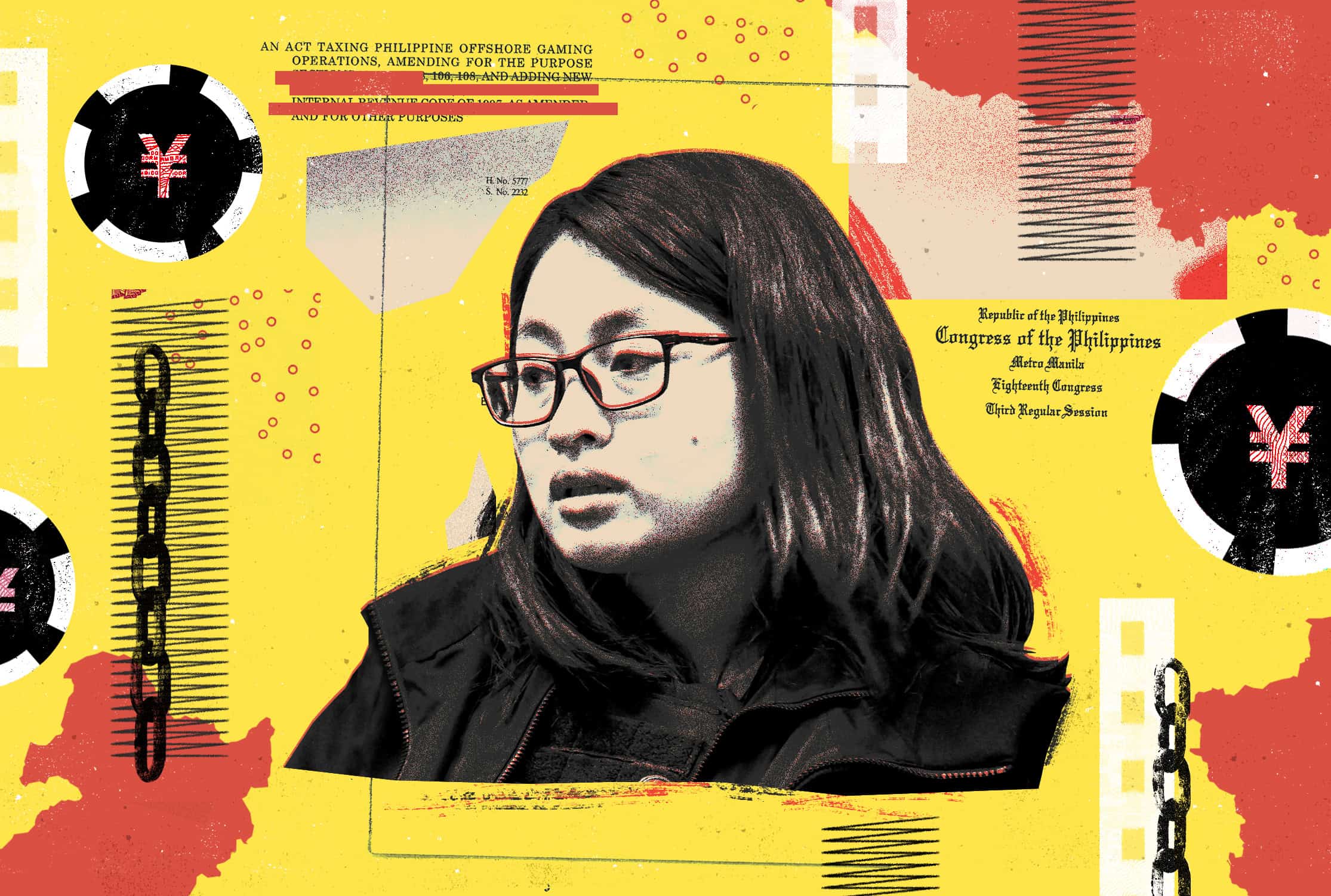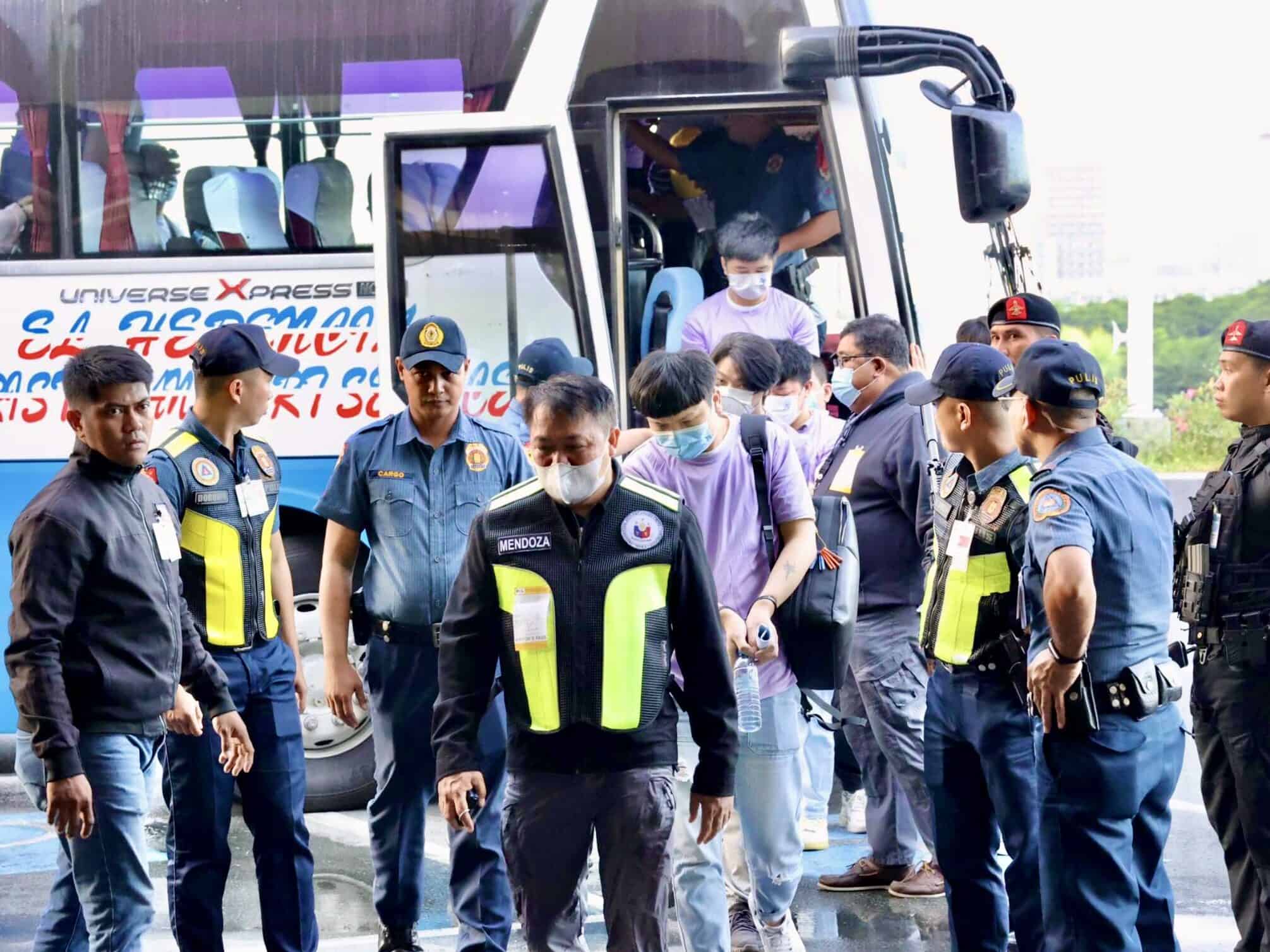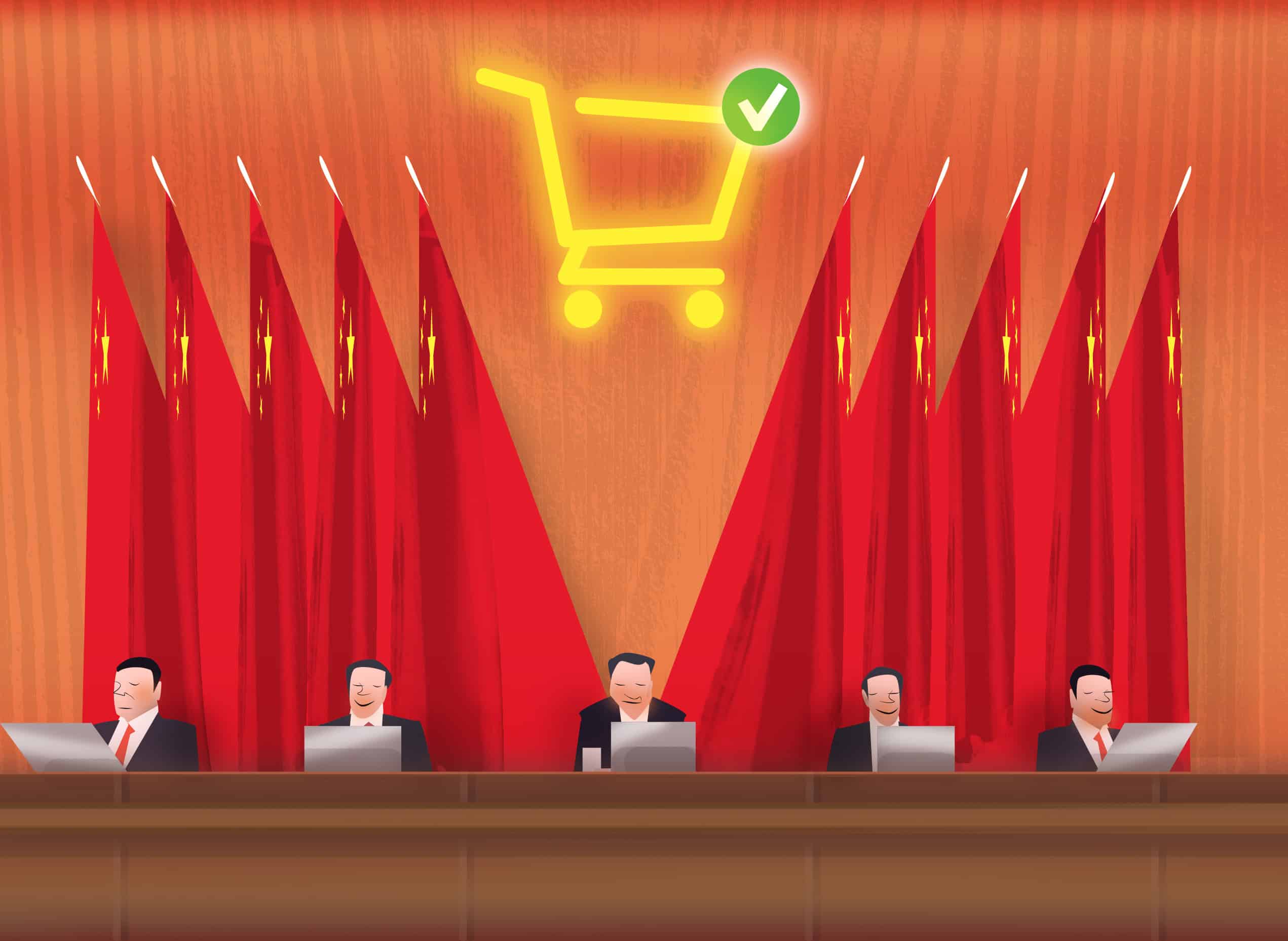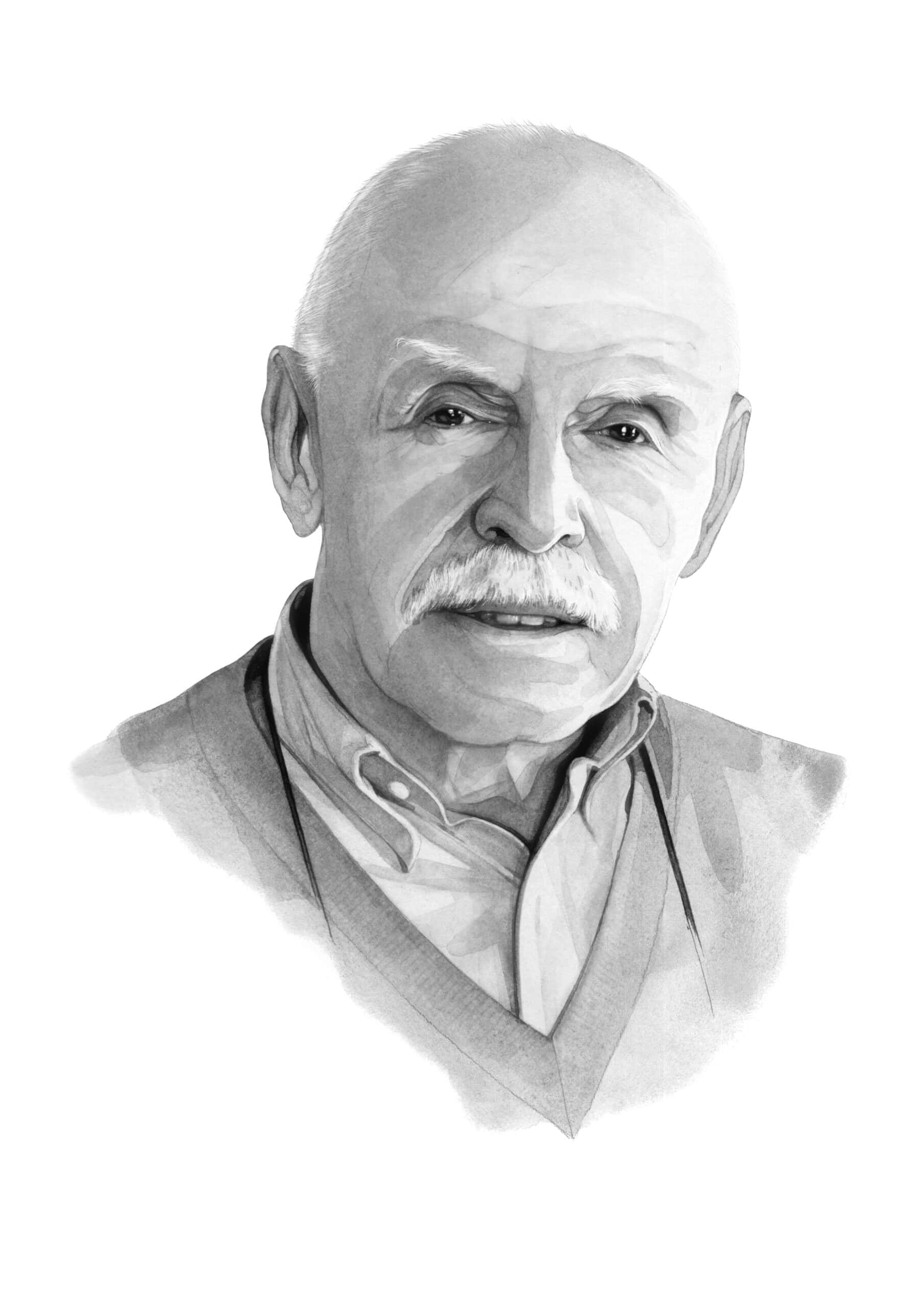
Alice Guo can’t remember it anymore. At least, that’s the phrase — Hindi ko na po maalala — that the deposed Philippine mayor repeated so often and so implausibly at a May hearing just outside Manila that it lit up social media with memes.
Facing accusations of fraud, human trafficking and espionage, the 38-year-old Guo could recall neither where she was born, nor why the birth was registered 17 years late (the same was true of her brother). She couldn’t remember her school, or the names of any of her teachers. A senator asked who Guo’s mother was. She didn’t know.

Guo had come seemingly from nowhere to be elected mayor of Bamban, a town of 78,000 people 60 miles north of Manila, in June 2022. In March 2024 authorities raided the Bamban complex of a so-called POGO — a Philippine Offshore Gambling Operation — on land half-owned by Guo. They discovered 800 apparent victims of human trafficking and torture, evidence of digital scamming, and high-powered firearms.
At her hearing, as she clutched a $1,700-plus tote from Paris atelier Goyard, Guo insisted she led a simple life. But Senator Risa Hontiveros presented evidence that Guo owned 16 vehicles, including a helicopter and one of only 350 McLaren 620R race cars ever made.
More explosive was that Guo’s fingerprints matched those of a Chinese national named Guo Hua Ping, who had migrated to the Philippines as a teenager.
Guo, Hontiveros said, “is a Chinese national masquerading as a Filipino citizen to facilitate crimes being committed by POGO.”
Hontiveros took her accusation one step further, accusing Guo of being an “asset” for the Chinese Communist Party (CCP). Bamban is just a few miles from a Philippine Air Force facility, and in future hearings, connections between Guo and an alleged CCP operative would strengthen the claim that she was more than just a blinged-out crook.

Even Philippine President Ferdinand “Bongbong” Marcos Jr. waded into the crime-thriller drama. “We’re wondering where she came from,” he said. “How did this happen?”
Guo refused to appear at her June hearings, blaming emotional trauma. The senate held her in contempt and ordered her arrest. A month later, Guo fled the country — first to Malaysia, then Singapore and Indonesia, where Interpol agents tracked her down outside Jakarta in September. She arrived in Manila shortly afterwards. “I have received death threats and I am asking for the help [of Philippine authorities],” she told a press briefing.
The chase was “hilarious in a way, but also deeply serious,” says Georgi Engelbrecht, a senior analyst at the International Crisis Group, a conflict-focused think tank. “Is Alice Guo an organized criminal? Is she a spy? Is she both? Is she neither? And why does it matter for the Philippines’ strategic thinkers?”
The incursion of hundreds of thousands of illicit actors from [China] into the Philippines, which involved the full manipulation of the political system, is a massive national security threat…
Jason Tower, U.S. Institute of Peace (USIP)
The answer to those questions may determine the Philippines’ rocky relationship with China. Marcos has abjured the foreign policy of his predecessor and rival Rodrigo Duterte, who courted Beijing while slinging mud at Washington. (Duterte once called Barack Obama a “son of a whore.”) Marcos, by contrast, says he “cannot yield” in disputes with Beijing over the sovereignty of islands and atolls in the South China Sea, and he has allowed the U.S. to deploy missile units on Philippine soil as part of its “Taiwan contingency.”

Marcos has also shuttered the POGOs, which have long been run by Chinese businesspeople, many with dubious pasts, and which have been linked to the kinds of crimes uncovered at Bamban. For two decades, the Philippines allowed POGOs to operate in order to collect taxes on Chinese online gamblers and to provide local jobs. Although gambling has been illegal on mainland China since the Communist Party took power in 1949, it has remained a national obsession, facilitated over the years by Triad-affiliated casinos in Macau, junkets to venues in neighboring countries, and online operations like POGOs.
Around 80 percent of sports bets worldwide are now laid illegally, and the global amount bet each year may be as much as $1.7 trillion. Asia represents around 65 percent of this market, with China its leading player. POGO equivalents in Vietnam are so brazen in their courtship of the illegal Chinese market that their Mandarin logos adorn the jerseys of English Premier League clubs.

But in recent years, social media, cryptocurrency and other tech innovations have propelled POGOs and their regional counterparts beyond just online gambling to the more profitable black market of online scams, which is now third in value only to narcotics and counterfeiting. At compounds, scammers use slave labor to target hundreds of thousands of victims — most of them in mainland China. The online scamming industry now has an estimated annual value of $64 billion (including over $3.5 billion in the United States), and police and politicians across Asia have been corrupted in the process of its growth. According to the United Nations, there may be over 220,000 people trafficked into working at these compounds, which increasingly resemble prisons, and incidents of torture and murder are not uncommon.
This new criminal underworld has impact far beyond Bamban, the Philippines, or even its Chinese marks. Indeed, the runaway gambling industry has created competing interests, chaos and corruption for governments across Asia — both to the detriment and advantage of Beijing. Alice Guo’s alleged espionage and ties to the CCP may transform the way Asian governments view the industry. It could also torpedo Beijing’s ambitious new Global Security Initiative — China’s attempt to recast itself as the continent’s premier law enforcer.

“The incursion of hundreds of thousands of illicit actors from [China] into the Philippines, which involved the full manipulation of the political system, is a massive national security threat,” says Jason Tower, at the U.S. Institute of Peace (USIP), a Washington-funded researcher. “These actors were infiltrating not only local administrations, governments and court officers, but even the defense space.”
As profits from gambling and scamming syndicates spread to the Middle East, Africa and even Latin America, Tower adds, they threaten not just Asian democracies like the Philippines but the global political order.
“This is now one of the most serious global security threats that’s out there.”
‘A HOP, SKIP AND JUMP’
That Chinese gambling facilitated industrial-level crime was nothing new when the Philippines welcomed its first POGO, in 2003. Casinos in the gambling mecca of Macau had laundered vast sums for Triad gangsters, Golden Triangle narcos and European mafiosi long before the People’s Republic of China was a glint in Mao Zedong’s eye. But the industry picked up pace in the 1990s, as cartels used casinos, often now located along China’s periphery in Laos, Myanmar, Cambodia or Vietnam, to wash billions in meth and wildlife trafficking proceeds.

The most notorious of these was — and arguably still is — the Kings Romans, a giant jungle casino carved out of a 3,000-hectare corner of Laos, on the banks of the Mekong River. Its owner, a former Heilongjiang timber merchant named Zhao Wei, channels through his casino a criminal smorgasbord of drug, animal and people trafficking, child prostitution and fraud. Visitors speak Mandarin, spend yuan and set their clocks to Beijing time. Laotian police almost never enter. “The land belongs to Laos,” a bar owner told me when I traveled there in 2019. “But the sky belongs to China.”
The Philippines, Washington’s oldest treaty ally in Asia, was a minor player in this China-dominated market until 2016. That year a truculent former mayor named Rodrigo Duterte became president and, despite maritime disputes stretching back centuries, steered his nation’s diplomacy towards Beijing. “I announce my separation from the United States,” he told a business delegation late that year. “America has lost.”

Duterte’s volte-face coincided with around $24 billion in Chinese aid and trade deals. POGOs also flooded in, with the Philippine government’s gambling agency generating almost $1 billion in 2016 — almost 17 percent more than its 2015 haul. Many were helmed by Chinese suspected criminals, including Kim Wong, a casino magnate linked to the 2016 Bangladesh Bank heist. Although POGOs often employed Filipinos, they almost exclusively targeted mainland Chinese gamblers, regularly bribing Chinese businessmen, CCP officials and United Front members to keep regulators and law enforcement at arm’s length. They also emerged as a useful way for rich Chinese to offshore their wealth.

If Beijing tolerated the gangsters, it was only to the extent that their profits lined the pockets of political leaders falling into line with CCP foreign policy — including, allegedly, Duterte and his cronies.
POGOs were a “gravy train,” says Filipino writer and broadcaster Manuel L. Quezon III. “Local governments [in the Philippines] did really well for themselves, both formally and informally, including the police.”
“The Duterte administration really enabled the entry of all these criminal activities,” adds Antonio Trillanes, a former Philippine naval officer and senator, who was fiercely critical of Duterte during his term. “And it enabled China to gain a foothold inside our country.”
…many of these [criminals] are protected — either because of massive levels of corruption across the country, challenges in terms of overlapping jurisdictions, or political infighting. Some are also laundering proceeds back into China…
Between 2017 and 2020, four million Chinese visited the Philippines, over double the number between 2014 and 2017. A senate inquiry speculated that the majority weren’t tourists but so-called “spinach farmers” drafted into POGO work either facilitating bets or running scams. (The Mandarin word for “spinach” is similar to “gambling.”)

As POGOs pivoted from gambling to the even more lucrative scamming trade, many of these workers focused on so-called sha zhu pan or “pig butchering” schemes. The phrase compares a scammer’s slow, methodical relationship-building with a mark to the fattening of a hog before slaughter: the scammer would imitate a love interest on social media, for example, to gain a mark’s trust, before convincing them to invest in a bogus firm or cryptocurrency, and then disappearing. Again, these schemes mostly targeted Chinese men.
“The scamming industry used all of the techniques that were developed by the online gambling industry, and it has adapted them for scamming,” says Tower, of the USIP. “That’s when China became more active in cracking down.”
Indeed, in many ways the POGO industry and its regional counterparts were starting to be problematic to Beijing. Although pandemic travel restrictions strangled the POGOs’ supply of “spinach farmers,” organized criminals leveraged expertise in social media and cryptocurrency to ramp up their pig butchering schemes. The scams raked in an estimated $75 billion globally between January 2020 and February 2024 — all while corrupting CCP officials, stealing from Chinese citizens and siphoning billions from the Chinese economy.
Around 2017, CCP officials started stepping up raids on compounds, including chasing operations out of Myanmar, and Chinese police now reportedly question people buying plane tickets to Southeast Asia. China’s National Anti-Fraud Center has even developed an anti-scam app, which China claims has helped reduce telecommunications fraud by nearly 30 percent.
“There’s a pretty strong crackdown underway, and the narrative back home in China is that the Chinese police are highly successful at keeping their nationals safe from online scamming, and that they’re doing a good job of identifying or capturing and extraditing criminals,” says Tower. “But the caveat here is that many of these [criminals] are protected — either because of massive levels of corruption across the country, challenges in terms of overlapping jurisdictions, or political infighting. Some are also laundering proceeds back into China at a time when the Chinese need cash.”

Xi Jinping personally implored Duterte to ban POGOs in 2019, after which Manila suspended the issuance of new gambling licenses. But Duterte allowed existing POGOs to continue to profit. Although they had once been a welcome supplier of jobs and income in the Philippines, the operations were increasingly associated with bribery, corruption and tax evasion. Worse still, they were suspected ganglions of scams and human trafficking.
Alice Leal Guo, meanwhile, had applied for a POGO license for Hongsheng Gaming Corporation in 2020, and filed her candidacy for mayor of Bamban the following October. Hongsheng, whose complex stood just yards from the mayor’s office, was shut down for running bogus cryptocurrency scams in February 2023. Another POGO took its place just three months later.

It is unknown how much money that second Bamban POGO amassed, but tens of millions of dollars were deposited into Guo’s bank account as mayor, and she was frequently spotted wearing some of the most exclusive jewelry and clothing on earth.
Whether or not the goal had always been for her to run for political office is unclear. But many say the chaos, corruption and interests of both the POGOs and the Chinese billionaires behind them almost made it inevitable.
“It’s just a short hop, skip and jump [from the POGOs] to local offices being up for grabs,” says Quezon. “But [when Marcos was elected] and his circle of officials didn’t know what was going on in their own backyard, that’s when they started to get alarmed.”
TROJAN HORSE?
When Bongbong Marcos became Philippine President in May 2022, some expected him to continue Rodrigo Duterte’s policy of cozying up to China. Washington had been decisive in the 1986 ouster of Marcos’s dictator father, who, alongside his shoe-loving wife, is thought to have embezzled up to $10 billion from the state.

But rather than harboring resentment, “the takeaway of Marcos Jr. might have been, ‘Never piss off the Americans,’” says Quezon. Joshua Kurlantzik, a senior fellow at the Council on Foreign Relations, also believes that Marcos has “a clear determination to side with the U.S.,” especially as “Laos and Cambodia are basically stuck as semi-satellite states of China.”
Marcos, for instance, has come out more strongly than Duterte on the South China Sea dispute, signing two laws enforcing Philippine sovereignty over its near-900,000 square-mile exclusive economic zone. And in March 2023, he granted Washington access to four military bases, including one in a province facing the South China Sea.
But China remains the country’s largest import and export market, and its central bank recently added the renminbi to its list of international reserves. In June Marcos’ economic planning chief said Manila hopes to “separate economy from politics,” adding that the Philippines is open to trade from “any country, including China.”
Except, that is, trade that comes from POGOs. The very next month, as Alice Guo absconded across the region and the full extent of crime at Bamban unfolded, Marcos declared he would ban POGOs.

China said it welcomed the move. “POGO breeds serious crimes and gravely undermines the interests of both Philippine and Chinese peoples,” read a statement from its embassy in Manila. “China is ready to continue its strong law enforcement cooperation with the Philippines and better protect the safety and well-being of the two peoples.”
Given that POGOs often benefit China-friendly politicians and remit billions into China’s flagging economy, some analysts argue the CCP’s enforcement against them is only half-baked. The allegations that POGOs and their counterparts in Southeast Asia are being used for Chinese espionage and influence also presents challenges to Beijing’s assertions.
A segment from an Al Jazeera documentary titled ‘She Zhijiang: Discarded Chinese spy or criminal mastermind?’ Source: Al Jazeera
In September, shortly after Guo’s rearrest, a Chinese-Cambodian illegal gambling kingpin named She Zhijiang presented Al Jazeera with a dossier that links Guo to a Communist Party office in Fujian. She, who is imprisoned in Thailand, told the outlet that Guo, like him, had been working for the Ministry of State Security. (Guo disputes the claims; her lawyer suggested She’s testimony may be “AI-generated.”).
The following month Hontiveros interviewed She’s former cellmate and confidant, who claimed Guo’s 2022 mayoral run had been “arranged by Chinese state security” and that there was a “correlation” between POGOs and spying operations as well as the Belt and Road.
The allegations lit a fire in the Philippines.
I don’t think every single POGO employee is a potential [CCP] agent, but it does appear that if you’re the Communist Party, you would always have a willing group of recruits who could be utilized — it means that it’s not difficult to access people.
Georgi Engelbrecht, a senior analyst at the International Crisis Group
“The Philippines is still, for all its super flaws, one of the more functioning democracies in the region,” says Engelbrecht, of the Crisis Group. “This hyper-awareness of Alice Guo and what it represents is a sort of awakening for many Filipinos. I don’t think every single POGO employee is a potential [CCP] agent, but it does appear that if you’re the Communist Party, you would always have a willing group of recruits who could be utilized — it means that it’s not difficult to access people.”

A senior multilateral official, who has met with law enforcement agents from China and across Southeast Asia and requested anonymity, says the Alice Guo case and the larger scamming black market is a “PR disaster” for China. “The narrative that has been building is similar to the Italians and the mob back in the day — which [the Chinese] don’t want.”
The official points to big arrests, including the 2023 capture of ten Chinese nationals in Singapore who had laundered an estimated $2.2 billion, as proof that Beijing is attempting to get its arms around the problem: “Are [the Chinese] well-intentioned in this? Honestly, I think yes.”
But for every big arrest, it seems, there is also evidence that Beijing is tolerating and even working with this new underworld. China has backed scammers in neighboring Myanmar, for example, as protectors of that country’s pro-Beijing military junta. And it has done little to combat scam compounds in Cambodia under its China-friendly autocrat Hun Sen.
In April 2022, Xi Jinping unveiled the Global Security Initiative (GSI), a vehicle for strengthened diplomacy in Southeast and Central Asia through cooperation on sovereignty, law and other issues. The initiative would see China and its allies “work together on regional disputes and global challenges such as terrorism, climate change, cybersecurity and biosecurity,” Xi told delegates at a conference in Hainan.
But Han Shih Toh, a chief analyst at Hong Kong-based Headland Intelligence, says it is at risk of looking more like a mafioso’s armtwist than an ally’s extended arm thanks to POGOs and their Chinese-run counterparts.
It would “hurt China’s image in countries other than the Philippines” should Alice Guo be unmasked as a CCP asset, he says.

That outcome appears more likely by the day. On November 26, the final day of Guo’s senate hearing, one of the Philippines’ top spymasters called the former mayor an “agent of influence,” adding that more work was needed to determine whether she was an actual CCP spy.
Marcos’s POGO ban, meanwhile, may also deal a blow to the more CCP-friendly Duterte family. Marcos has repeatedly accused the Duterte family of enriching themselves through both POGOs and the Philippines’ drug trade. And Tony Yang, the brother of Duterte’s economic adviser Michael Yang, was recently outed as a Chinese citizen, with links to Alice Guo’s POGO at Bamban.
The revelation was a “PR gift to Marcos,” says Han Shih Toh. Since then, the feud has intensified, with impeachment threats and even an alleged assassination plot. Rodrigo Duterte has announced plans to return to politics, first as mayor of his home city of Davao. But for now his foe Marcos holds all the cards of power, and his western alliance looks set to hold.

Vanda Felbab-Brown, an organized crime expert at the D.C.-based Brookings Institution, says while it will take time to “purge” the POGO criminals who are “extremely embedded” in the Philippines’ business and political networks, the interesting thing to watch is “how fast or not [the scam industry] will spread to other criminal groups.” Mexico’s second-largest drug trafficking organization, the Cartel Jalisco Nueva Generación, for example, has already tried its hand at scamming, says Felbab-Brown.
And besides, she adds, “The Philippines is not the only country where China is cultivating assets in the political domain.”
Indeed, bureaucrats in Cambodia are thought to earn millions, if not billions, from kickbacks from Chinese scammers. Ethnic rebel groups in Myanmar, meanwhile, are increasingly turning to the industry for easy weapons revenue. And Laos has announced its intention to snatch some of the Philippines’ gambling wealth by establishing the Laos Offshore Gaming Authority, or LOGA, which a local gaming operator said in 2022 “will be a much cheaper version of POGOs with good food and entertainment.”
POGO-like compounds have also been uncovered in Malaysia, Dubai, Peru and parts of Africa.
“All you need is a weak jurisdiction, and a corruptible jurisdiction,” says the intelligence official. “A lot of these countries are not going to have a clue what you’re doing. It’s just a bunch of guys on computers running something.”
According to John Wojcik, an organized crime analyst at the UN Office on Drugs and Crime (UNODC), the issue is continuing to snowball. Tech innovations, including malware, AI and deepfakes, he says, “have not only expanded the scope and efficiency of cyber-enabled fraud and cybercrime; they have also lowered the barriers to entry for criminal networks that previously lacked the technical skills.”
“The evolving situation,” he says, “is rapidly outpacing governments’ capacity to contain it.”
Risa Hontiveros struck a similar foreboding note as she closed out Guo’s senate hearing in November. She said Guo, who was not present at the hearing, was “a Chinese national mocking our Filipino identity to amass wealth and commit crimes to true Filipinos.” And POGOs, she warned, were “nothing but a Trojan horse.”

Sean Williams is a British reporter and photographer based in New Zealand. His work has been published by The New Yorker, Harper’s Magazine, GQ, The Daily Beast, The New Republic, Wired, The Economist and more. @swilliamsjourno




